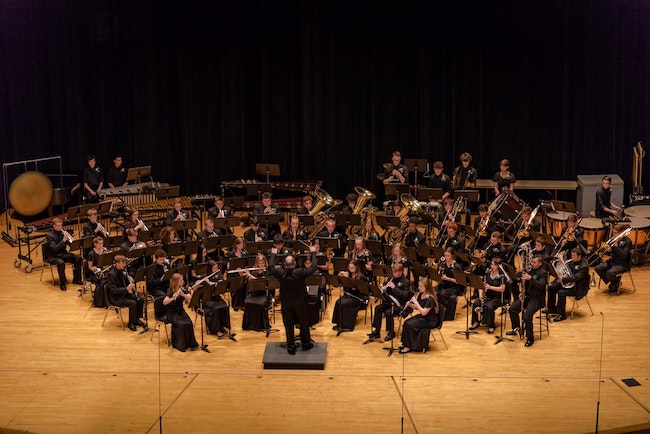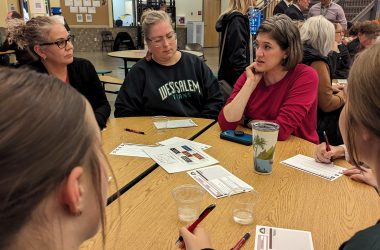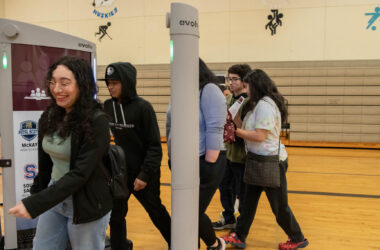 The West Salem High School band performs at the OSAA 6A State Band Championships in May 2019 with director Todd Zimbelman conducting (Courtesy/West Salem High School)
The West Salem High School band performs at the OSAA 6A State Band Championships in May 2019 with director Todd Zimbelman conducting (Courtesy/West Salem High School)
Ten minutes in, West Salem High School’s ninth grade band class appeared strangely silent.
A dozen students had trombones, clarinets, flutes and tubas raised to their mouths, but each was playing alone in their bedroom or next to a desk, with microphones off.
Teacher Todd Zimbelman waited as students finished a technical exercise, then asked everyone to demonstrate good posture.
“You can sit up nice and tall, spine nice and straight. Most of you are doing pretty well, I just want to remind you,” Zimbelman said.
Music programs have long been a point of pride for the Salem-Keizer School District, which boasts nationally-recognized high school bands and choirs, booster clubs to support programs and a music teacher at every elementary school.
Zimbelman and colleague Ashley Alexander have spent years building West Salem’s band program. It was recently one of three high school programs in the U.S. to receive top honors from the National Band Association, based on a portfolio of recordings and awards spanning years.
Now, teachers who train students to harmonize their voices or balance the sound of flutes, clarinets, trumpets and saxophones are rethinking what music education looks like in an environment where playing or singing together is nearly impossible.
“Music making and ensemble music making, there’s such a collaborative unified collective approach that creates this energy,” Zimbelman said. “A lot of what we really love and what the students are really attracted about being in our programs is missing. But we also realize this is temporary, we’re all surviving right now.”
Every district school is offering some sort of music instruction virtually, but enrollment is down significantly over last year. That’s in part because schedule changes for online school mean many students are only taking music for two quarters, rather than a full year. Some students have also moved to EDGE, Salem-Keizer’s new virtual program, which doesn’t offer band or orchestra.
Across the district, about 5,300 middle and high school students are enrolled in a music class for first or second quarter this year, down from about 7,770 during first semester last year.
High school band
For high school students who have been playing for years, the solo or small group playing on Zoom lacks what made band fun.
Lucas Dunn, a West Salem senior, plays clarinet in the wind ensemble, the most advanced musical group. He’s also the drum major for the marching band and wants to continue playing in college.
Dunn is used to eating lunch by the band room with his friends, helping students learn to march at summer band camp and taking trips to perform.
Now, he’s in a midday band class with mostly freshman because of a scheduling conflict.
Using software called SmartMusic, students can play their part along with a full band recording of a song, record themselves and get a report marking notes or rhythms played incorrectly, features that help teachers track student progress easily.
Zimbelman has worked hard to teach classes in different formats, mixing activities like technical exercises and solo practice in digital breakout rooms to give students variety, and assignments are tailored to the students’ skill level.
“He does a good job of changing it up so it’s not just the same every time,” Dunn said.
Sometimes, Zimbelman unmutes the class and has everyone play together, even though varying Internet connections mean the result will be cacophony.
Dunn said he enjoys practicing solos on his clarinet and is still taking private lessons, but he said the class isn’t as challenging or as fun as a true ensemble.
“It’s not band in my opinion. There’s not much else we can do about it,” he said.
He enjoyed the modified band camp marching band in the fall, practicing physically distant marching outdoors without instruments. That stopped when the district curtailed athletic and other in-person activities in mid-November in response to spiking Covid cases in the community.
Dunn said he’s hopeful more normal band activities could resume in the spring. Despite the challenges, he said he’s glad he didn’t quit band this year.
“I thought about it for a second but I realized I wanted the band program to continue and I knew that if all the seniors quit it would be bad for the band program,” he said.
Keeping music social
Stephen Lytle knows how important music can be for students.
Lytle, the district’s coordinator for music and drama programs, came to Salem in July after a career as a college and high school band director and music arranger. He said a music ensemble is often a place where a student feels they belong at school, something they can look forward to even if they’re struggling in other areas.
“A lot of times it’s their friend network. That experience permeates everything and colors everything about their school experience,” he said.
Lytle applied for the job before the pandemic shut down schools across the U.S. and had no idea his first months would be spent helping teachers run choir or orchestra online. He said a district goal has been preserving some of the social aspect of music, keeping classes a place where students feel they can connect with their teachers and each other by encouraging icebreakers and other social activities.
Technology problems and a delay getting needed software meant most music classes were nonstop tech support instead of music for the first weeks of the school year, especially in middle and high school. But now, teachers report their students know how to get sheet music online and record themselves, and classes are running more smoothly.
Elementary school classes have had an easier adaptation, Lytle said. Their lessons, focused on basic concepts like rhythm and singing simple melodies, translate better on Zoom and make use of kits sent home with students at the start of the year.
At Chavez Elementary School, Karly Schindler opened a recent class by dancing and inviting students to join her from their homes. Over the next half hour, she guided first graders through a rhythm lesson, singing the children’s song “Cat Goes Fiddle-I-Fee” as students tapped along with wooden sticks.
Schindler, who’s teaching from a home office with two pianos, said her classes look about as they would in person, though seeing which kids are grasping a song in real time is harder.
“We don’t have the ability to sing together and I can’t give immediate feedback to every kid,” she said.
Her cats sometimes appear on camera to join a dance. In a typical class, she said about 70% to 80% of kids are present and engaged, similar to what classroom teachers report for their online classes.
“I see smiling faces, I see excited kids. I see them coming, I see them engaging. All of those lead me to believe that things are going well,” she said.
Middle and high school teachers, who usually work with ensembles, have had to make more changes.
Anticipating students returning to in-person classes at some point during the school year, the district grouped students by grade. The goal was to limit the number of students interacting with each other during the day, a requirement in the state’s Covid protocols.
That makes sense for math or English, where most freshmen take the same class.
But a concert choir or orchestra that’s audition-based usually includes students from various grades.
At Whiteaker Middle School, choir teacher Rebecca Hollen’s online schedule has no concert choir – just sixth- seventh- and eighth-grade classes. Most contain a mix of students, some of whom are new to singing, and some who have been performing for years.
Hollen said she tries to start each class with a brief social activity to help students relax. Last week, she played a round of “would you rather,” asking students if they’d choose to time travel a million years into the future or a million years back.
“I find that when we do something silly like that, they are much more likely to turn on their cameras and engage,” she said.
Her class of seventh graders was working to learn “Ain’t Gonna Let Nobody Turn Me Round,” a folk song sung at many civil rights marches and protests in the 1960s.
Hollen put each student into a separate space on Zoom chat, letting each student record the song on their own, then played the recordings together to get feedback from the group. Students were quick to reply in the chat – pitch was good, but a few of them were too loud or too quiet, and some words weren’t enunciated clearly.
Hollen tweaked the recording on her computer, adjusting so some students voices’ would be louder or quieter, then played it back to the class. The verdict? Much better.
“I haven’t done that before! That’s crazy, I guessed correct! I’m just going to celebrate that because I know your voices well enough,” she said.
No performances
For now, schools haven’t scheduled any music programs. All-city band and orchestra competitions have been canceled, and while Lytle said there’s interest in figuring out a digital way to showcase student talent, the district has no concrete plans yet.
Some ensembles have produced their own online performances, like a Sprague High School orchestra fall concert which debuted on YouTube Nov. 12.
Early in the school year, Hollen said she was on YouTube watching a choir perform on America’s Got Talent when she realized her students likely wouldn’t be able to perform this year.
“I was watching that video and watching their director direct them and I just started crying when I saw it,” she said. She thought about how proud the director must have felt. “I just remembered all the moments on stage when I felt that way about my students,” she said.
But Hollen said there has been benefit to a more individual focus in choir. Not having to arrange music and plan shows has lightened her workload, she said, and smaller classes let her get to know students better.
She hopes more solo singing will improve readiness for ensemble performance.
“Students are more aware of their own voice. They can’t hide behind their peers. So I’m really hoping when we can be back in the classroom my singers will be more personally confident,” she said.
At West Salem, Zimbelman worries about students like Dunn who have worked for years to perform at a high level and won’t get a chance to do so before graduating.
“They have to be psychologically struggling with all this. I couldn’t imagine the pain they’re feeling missing out on this. It’s like you train for a marathon and you can’t run the marathon,” he said.
He tried to keep positive for students, reminding them that playing music for the joy of music is worthwhile.
“I keep trying to impress upon the students that aspect. Be grateful that you have a beautiful clarinet, that you get to play that,” he said.
Lytle said some students who would normally be in an ensemble aren’t taking music this year at all.
“They will have had one year of not playing at all or maybe very very little playing. The ones that are involved in classes, they’re not having the same year-long experience,” he said.
Beginning band programs, where older elementary students begin learning to play instruments, aren’t starting until February. Once they do, it’s not clear how effectively even the most dedicated music teacher can remotely instruct a 10-year-old who’s never held a clarinet before.
The success of West’s band is built on years of work from elementary and middle school music teachers, Zimbelman said. That means it could take years to build back.
Zimbelman said he’s spent his career building programs, often leaving jobs once he feels he’s created something that’s good enough to hand off to a successor. He’s stayed no more than six years in most, but after 12 years at West, getting an award-winning band back to its best is the sort of challenge he wants.
“I’m not just going to walk away from these kids because I’m frustrated. I love the kids too much. I love the community too much,” he said.
Contact reporter Rachel Alexander: [email protected] or 503-575-1241.
HOLIDAY SPECIAL: SAVE 25% off a one-year subscription to Salem Reporter. Get quality Salem news delivered to your inbox. Every subscription helps build coverage of the Salem community. Order online HERE.

Rachel Alexander is Salem Reporter’s managing editor. She joined Salem Reporter when it was founded in 2018 and covers city news, education, nonprofits and a little bit of everything else. She’s been a journalist in Oregon and Washington for a decade. Outside of work, she’s a skater and board member with Salem’s Cherry City Roller Derby and can often be found with her nose buried in a book.









